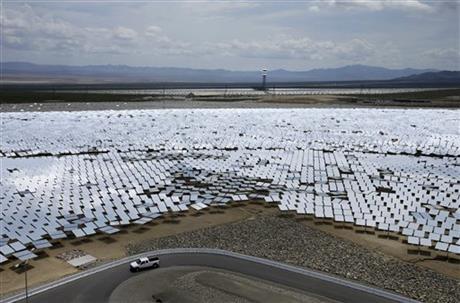‘Green’ lobby pushes to extend lucrative tax breaks

POLITICAL POWER: The world’s largest solar array is in Nevada, Sen. Harry Reid’s home state. Solar projects receive the biggest federal tax subsidies per megawatt of any form of energy.
By Kenric Ward | Watchdog.org
WASHINGTON, D.C. — As the lame-duck Congress limps to the finish line, billions of dollars in dubious federal energy subsidies remain in limbo.
The perennial procrastination has solar- and wind-power lobbyists scrambling for renewal of their industries’ expiring tax credits.
If past is prologue, lawmakers will keep the money flowing via “tax extenders,” says Matt Mitchell, a policy analyst at George Mason University’s Mercatus Center.
Mitchell says the legislative stall is by design.
“It’s not an accident,” he told Watchdog in an interview. “Granting temporary privileges or punishment allows Congress to fund-raise on them over and over again.”
Sen. Charles Grassley, R-Iowa, chided his congressional colleagues last week for delaying action, declaring, “This is no way to do business.“
Grassley helped enact the wind tax credit in the early 1990s, with a prediction that the federal supports would only be short-term.
“Here we are, more than 20 years later, and we still have them,” Mitchell noted. “Can we really say they’re temporary?”
The International Energy Research group reports widening disparities in government subsidies granted to producers. According to the IEG:
- Oil receives 64 cents in federal tax credits per energy unit produced.
- Other fossil fuels receive 82 cents.
- Nuclear power receives $3.14.
- Wind power gets $56.
- Solar power rakes in a whopping $775.
Renewable energy credits survive with bipartisan backing. Outgoing Democratic Senate Majority Leader Harry Reid, for example, has a personal and political stake in giant solar farms in his home state of Nevada.
Sean Lansing, director of the Virginia branch of Americans for Prosperity, took aim at the wind industry.
“It’s time for Congress to stop using taxpayer money as handouts for Congress’ friends,” he said. “The American people cannot afford their tax dollars being redistributed to subsidize an industry whose economic benefits have consistently fallen short of expectations.”
Grassley acknowledges “the tax code has gotten too cluttered with too many special-interest provisions.”
“But,” he adds, “just because we haven’t cleaned up the tax code doesn’t mean we should pull the rug out from under domestic renewable energy producers.”
Mitchell agrees with Grassley’s assertion that dithering on Capitol Hill “harms investment and business growth.” Like other free marketeers, Mitchell would end all energy credits and lower tax rates for everyone.
Congress did strip out many subsidies during the Reagan years. But “green power” advocates burrowed back with a vengeance, reopening loopholes and larding the tax code with even bigger breaks for renewables.
The Obama administration has widened the divide by waging a war on coal — a triumph of politics over power.
Today, for example, wind and solar power ventures combined receive 77 percent of the federal tax breaks, but produce just 11 percent of the nation’s electricity. The ratio is almost exactly reversed when it comes to coal.
Bjorn Lomberg, a left-of-center political scientist and statistician from Denmark, questions the costs and benefits of the climate-change agenda as framed in Washington.
“We actually end up paying more for a partial solution than the cost of the entire problem. That’s a bad deal,” writes Lomberg, author of “The Skeptical Environmentalist” and other books.
Kenric Ward is a national correspondent for Watchdog.org. Contact him at (571) 319-9824. @Kenricward







